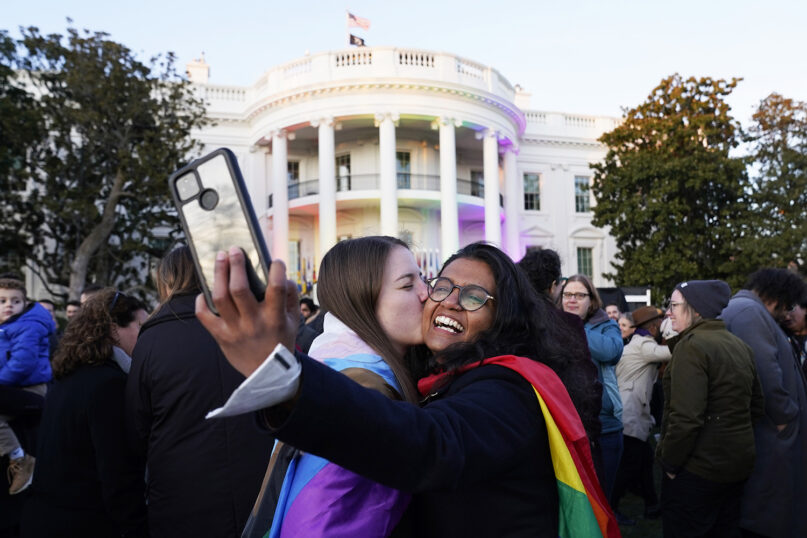(RNS) — Visibility has a cost, and enormous power. On Tuesday (Dec. 13), we stood together — Jeremy in his rainbow kippah, Laura in her clerical collar — on the White House lawn to bear witness as President Joe Biden signed the Respect for Marriage Act into law. We had traveled from Boston, foremost as friends, but also as leaders in our respective Jewish and Christian communities. We were there to see this law be signed, and to celebrate, but also to be seen.
Public commitment to faith doesn’t always come without tension and pain. The same goes for public commitment to authentic LGBTQ identity. Each of us has experienced times when those we cherish as part of our own faith communities don’t cherish us in equal measure. Each of us has endured the pain when some of our people have rejected our legitimacy as faith leaders to serve on their behalf — at least if we chose to also represent our full selves as queer leaders while doing so.
The message is clear: Split yourself in two. Be religious or queer. But dare not be both.
But we resist the division. It is an act of devotion to stay connected to oneself, one’s tradition, one’s heritage when everything else is trying to pull you apart. We say in body and spirit: We will not be bifurcated.
RELATED: Church of England bishops head for showdown on marriage for same-sex couples
And yet, there is not really a choice. We just are queer and religious. This is who we are, fearfully and wonderfully made.
Mildred Loving, who with her husband, Richard, was a plaintiff in Loving v. Virginia, the Supreme Court case that made interracial marriage legal in the U.S., said previous generations were “bitterly divided over something that should have been so clear and right.”
We recognize that our presence — our literal embodiment — raises questions that some in our respective religious communities would rather ignore. Some wish that we just wouldn’t show up at all. Some wish all these complexities would just go away — that people wouldn’t ask and others wouldn’t tell.
This week, thanks to bipartisan action, we moved, finally, to codify in law official recognition of our families, our lives and our identities, to recognize that we are. But Congress not only codified the rights of interracial and queer families, it codified the freedom not to honor our queer families in religious spaces where that recognition violates their beliefs.
In so doing, Congress demonstrated that progress is possible without threatening either the rights of faith communities or the rights of queer and interracial families.
Admittedly, lawmakers acted only when their backs were against the wall, when the Supreme Court seemed on the verge of withdrawing these rights that were once assured, and only after the Defense of Marriage Act had stood for 36 years.
Still, our nation has shown that progress is possible, that recognition in law can finally come, that a dynamic tension between two freedoms could be resolved in a way that satisfies the principles of a wide majority of our fellow Americans. That the two of us can be seen for who we are.
RELATED: LGBTQ students wrestle with tensions at Christian colleges
We stood on the White House lawn, visible in all of our identities, resisting the divisions that have been imposed on us and on this big, messy, multireligious and wildly diverse country itself. And we asked ourselves: If Americans can find ways to honor multiple identities, multiple values and rights without compromise or further division, but with honor and respect for the sacred within each of us, what else is possible?
(Jeremy Burton is CEO of the Jewish Community Relations Council of Greater Boston. The Rev. Laura Everett is executive director of the Massachusetts Council of Churches. The views expressed in this commentary do not necessarily reflect those of Religion News Service.)





